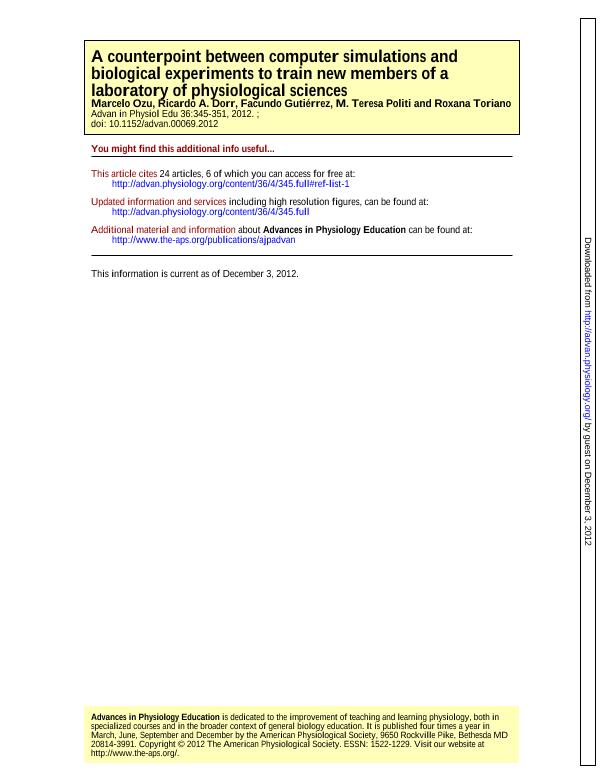Artículo
A counterpoint between computer simulations and biological experiments to train new members of a laboratory of physiological sciences
Fecha de publicación:
12/2012
Editorial:
American Physiological Society
Revista:
Advances In Physiology Education
ISSN:
1522-1229
Idioma:
Inglés
Tipo de recurso:
Artículo publicado
Clasificación temática:
Resumen
When new members join a working group dedicated to scientific research, several changes occur in the group's dynamics. From a teaching point of view, a subsequent challenge is to develop innovative strategies to train new staff members in creative thinking, which is the most complex and abstract skill in the cognitive domain according to Bloom's revised taxonomy. In this sense, current technological and digital advances offer new possibilities in the field of education.Computer simulation and biological experiments can be used together as a combined tool for teaching and learning sometimes complex physiological and biophysical concepts. Moreover, creativity can be thought of as a social process that relies on interactions among staff members. In this regard, the acquisition of cognitive abilities coexists with the attainment of other skills from psychomotor and affective domains. Such dynamism in teaching and learningstimulates teamwork and encourages the integration of members of the working group. A practical example, based on the teaching of biophysical subjects such as osmosis, solute transport, and membrane permeability,which are crucial in understanding the physiologicalconcept of homeostasis, is presented. © 2012 The American Physiological Society.
Palabras clave:
Creativity
,
Education
,
Experimental
,
Physiology
,
Simulation
Archivos asociados
Licencia
Identificadores
Colecciones
Articulos(OCA HOUSSAY)
Articulos de OFICINA DE COORDINACION ADMINISTRATIVA HOUSSAY
Articulos de OFICINA DE COORDINACION ADMINISTRATIVA HOUSSAY
Citación
Ozu, Marcelo; Dorr, Ricardo Alfredo; Gutierrez, Facundo; Politi, Teresa; Toriano, Roxana Mabel; A counterpoint between computer simulations and biological experiments to train new members of a laboratory of physiological sciences; American Physiological Society; Advances In Physiology Education; 36; 4; 12-2012; 345-351
Compartir
Altmétricas




